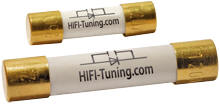...I have used ceramic-encased fuses, but as required for flame resistance, not for their anti-vibration properties...
Yes. They are also easier to dig out of the holder when they do blow.
...I have used ceramic-encased fuses, but as required for flame resistance, not for their anti-vibration properties...
I really expected to get more of a response from the objectivist measurement crowd. Especially the part about cryogenics. Just not as easy to bait them anymore.
Any "signal junction" can alter the signal passing throug it. I have seen this demonstrated with cables on an oscilliscope. The fuse and its holder is a "junction." This is one of the reasons I beleive the cable connector is as important as the cable itself.To the extent it is audible and how you deal with it is another question.
What exactly are you trying to say?

"... Reviewers continue to ignore the scientific method, and a few even disparage those who follow it. Measurements are not a requirement for product reviews, and those that are seen cover a wide range from almost useless to quite impressive.
Quoted from F.E. Tool, "Sound Reproduction" 2008
| Steve Williams Site Founder | Site Owner | Administrator | Ron Resnick Site Owner | Administrator | Julian (The Fixer) Website Build | Marketing Managersing |

